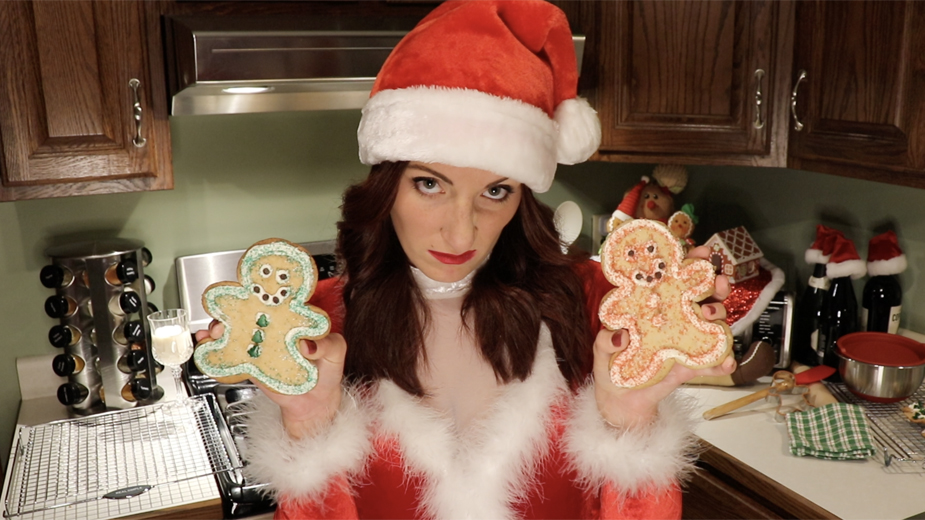YOUNGSTOWN, Ohio – The high degree of creativity local theaters are demonstrating in converting from stage to video, because of the pandemic, is remarkable.
The latest round of shows runs the gamut, and each troupe takes a different approach to filming. But all stick the landing.
Stage Left Players tackled “Sherwood – The Adventures of Robin Hood,” a comedy of unbridled silliness meant to be delivered with a straight face.

One of the actors breaks the fourth wall of the virtual experience before the show even starts, leading the viewer into the theater in downtown Lisbon, taking him to his seat, and then giving directions to the bathroom.
“Sherwood,” written by Ken Ludwig and directed by Kandace Cleland, tells the story of Robin Hood’s life from birth – literally, from birth.
It’s an inspired bit of Monty Python-esque knavery, suitably delivered with just the right amount of officious bungling and bravado.
I hope SLP can keep it around a while. The straight-faced zaniness is relentless.
If comedy is the hardest form of acting, SLP’s cast is brilliant. But props also go to the life-sized puppets that become characters in closeup scenes (social distancing, after all). Some of them have their own personalities.
With intentionally sloppy sound effects – think clanging that doesn’t quite match the sword fighting – and repeated cuts to an audience of cardboard cutouts, “Sherwood” is a scream.
In fact, it’s funnier as a video than it ever could have been as a stage play.
Intentionally uneven film editing only elevates the troupe’s “unintentionally funny and endearingly bad” conceit.
A NIGHT OF OPERA AT HOME
Of all the theatrical art forms, opera stands to benefit most from the video treatment, because it makes it more accessible and digestible, a learning tool. Newcomers could become familiar with the story, while gaining an appreciation for the power, stamina and range of opera singers.
It’s a new format that is dying to get out and you can almost taste it in Opera Western Reserve’s video production, “A Taste of Traviata.”
The production begins with Verdi’s grand opera “La Traviata” and then boils it down to 90 minutes, covering the whole story but without all the choral repetition and grandiose staging.
The full glory and spectacle of dozens of singers on a stage is absent. But when push comes to shove, “A Taste” lays bare the emotion and pain the same as a full-blown live production would.
Condensing the running time brings the plot to the surface and makes it easier to focus on the characters and the music.
As always, OWR assembled impressive talent for “A Taste.” It is sung in Italian but you can hear the urgency and anguish in Mackenzie Whitney’s voice as he sings the part of Alfredo; the despair in Karen Barraza’s Violetta; and the steadfast authority in Brian Keith Johnson’s Germont.
“A Taste” was shot in and around Stambaugh Auditorium, which provides some impressive sets, although future stabs at this art form would look even better in more intimate spaces for some scenes.
The vocals were recorded in advance in Stambaugh’s acoustically fine auditorium. There was some disconnect, however, in syncing it to the actors as they sang.
All in all, it was a daunting task that turned out well enough, and laid the groundwork for even better efforts in the future.
‘SONGS FOR A NEW WORLD’
Rachel Ruggieri’s “Surabaya Santa” alone is worth the fee to watch Millennial Theatre Company’s virtual show, “Songs for a New World.”
Dressed in a slinky Santa suit, a cocktail in hand, Ruggieri delivers the clever kiss-off number like a woman who’s reached her limit. She’s fed up being the wife of St. Nick, cooped up in the house with some elves while her famous husband flies around the world in a sleigh.
But hers is not the only standout performance.“Songs” is brimming with them, including “I’m Not Afraid” by Broadway actor Lisa Howard.
Howard’s voice is fantastic but the rest of the cast members hold their own. It’s a uniformly solid group that brings to life a collection of musical-theater style songs – loosely connected in theme but very similar in style – in a series of taped, and mostly solo, performances.
Krystin Skidmore’s “Just One Step,” which has a similar theme to “Surabaya Santa,” starts the show on a fun note.
Other songs that stay with you include Will Ellis’ “King of the World”; and Jordan Holliday’s powerful “The Flagmaker 1775,” in which she portrays the mother of a soldier at war.
“Songs” is not a musical in the traditional sense. There is no through-story. Instead, it’s a collection of more than a dozen songs that look at the moment when life is at a tipping point, be it from tribulations, disappointments, realization of a truth, disillusionment, yearning, exasperation or whatever.
Maybe one day a musical will be built around the songs – all of them are great pieces of storytelling.
Joe Asente, Millennial’s artistic director, further distances the show from the virtual pack with editing and effects that make it greater than the sum of its parts.
YOUNGSTOWN ON FILM
Two new films with Youngstown DNA show the city at its worst and at its best.
First up is “Worst. Christmas. Ever.,” the raunchy comedy by Youngstown filmmaker Johnny Chechitelli that premiered Nov. 3 on streaming and cable platforms.
It centers around Sophia, a 15-year-old girl in a fictional Ohio town who discovers she is pregnant on Christmas Eve. Sophia seeks solace and advice from her family and friends. But they’ve got issues of their own.
Chechitelli knew what he wanted and achieves it in this low-brow – and entertaining – comedy that pokes a stick in the eye of the traditional holiday fluff.
He has an unerringly good eye for the trashiest behavior, clothing and even Christmas decorations. Great attention is paid to the smallest of trashy touches, stuff that any true dirtbag would wear like a badge of honor.
But the nastiness doesn’t weigh it down. Buoyed by wickedly cheerful holiday spirit, “Worst” is an escape from the nauseating niceties of the season. The cast revels in the muck – although there is one fleeting moment of redemption that makes you believe Sophia is going to be all right.
The microbudget film was shot entirely in the Youngstown area with actors who are totally game. There may be some sound editing flaws, but the film is amusing from its beginning to the 10 minutes or so of outtakes at the end.
DOCUMENTARY WITH DIFFERENCE
Coming from out of the blue is the lofty documentary “The Place That Makes Us,” which was released on Nov. 11 with almost no advance notice.
“The Place” has absolutely nothing in common with “Worst. Christmas. Ever.”
It also has nothing in common with the many documentaries and TV segments that treat Youngstown as the poster child for post-industrial America, a place of hopelessness, decay and little else.
Instead, it’s an up-close look at some people who are digging in their heels to revitalize the city, and not escaping to greener pastures.
“The Place” was written and directed by Karla Murthy, who became familiar with the city through her occasional visits as a producer for PBS NewsHour Weekend.
She focuses mainly on Ian Beniston, executive director of Youngstown Neighborhood Development Corporation, and 1st Ward Councilman Julius Oliver. With a style more often seen in the PBS’ acclaimed POV documentary series, Murthy reveals the positives in the city, on a personal level.
She couches the city’s gritty neighborhoods and abandoned factories in dreamy cinematography, lingering long enough for viewers to imagine its past, to see its beauty, and admire its resilience.
There is no narrator, and no attempt to guide or influence the viewer. Murthy’s hands-off style lets you draw your own conclusion. That is what makes “The Place” appealing to anyone with an interest in urban renewal or the people who live in the seldom-seen corners of America.
Pictured: Rachel Ruggieri sings from the perspective of a long-suffering Mrs. Claus in Millennial Theatre Co.’s “Songs for a New World.”
